PROFESORES:
Jorge Alejandro Perez
EMAIL INSTITUCIONAL:
jhonnyer.valencia.a@liceopinoverde.edu.co
jorge.perez.g@liceopinoverde.edu.co
GRADE: 10th Track A
INTRODUCTION
Chemistry is the science responsible for studying all phenomena that occur in matter. In this chemistry course, we will take students on a journey that will showcase the various discoveries, theories, and laws that strengthen scientific advances and experimental practice, which are the foundation of this learning process.
GENERAL OBJECTIVE
-The objectives for MYP chemistry are to promote in students an analytical, inquisitive, and flexible mindset to ask questions, solve problems, elaborate explanations, and evaluate arguments, where they:
-Develop skills to design and carry out investigations, evaluate evidence, and reach conclusions, reflecting on learning experiences and making informed decisions.
-Understand and consider science and its implications as a human activity that has both benefits and limitations.
COMPETENCIES/SKILLS TO BE DEVELOPED
-During the course, students acquire research skills in which they establish connections between scientific research and related moral, ethical, social, economic, political, cultural, or environmental factors.
-They strengthen critical thinking skills by interpreting data obtained in scientific research.
-They develop communication skills by appropriately representing visual data for interested audiences.
METHODOLOGY
-Lectures
-Inquiries
-Workshops
-Practice with simulators
-Guided projects
Unit 1: Kinetics and Equilibrium
Reaction Rate and Collision Theory
Factors affecting the reaction rate: nature of reactants, concentration, surface area, catalyst, temperature.
Unit 2: Thermochemistry (Energy)
Temperature and Heat.
Qualitative and Quantitative Measurements
Energy units, enthalpies, Hess's law.
Exothermic and endothermic processes.
Unit 3: pH, acids, and bases
Arrhenius and Brönsted Lowry theories.
pH concept, scale, and indicators
Acid-base reactions
Unit 4: Organic Chemistry
Definition of organic chemistry
Explanation of carbon as the basis of life
Organic functions: Alkanes, alkenes, alkynes, alcohols, and ethers.
Organic nomenclature for each organic function.

- Profesor: Jorge Alejandro Perez Garcia
- Profesor: Brandon Suarez Jiménez
- Profesor: Jhonnyer Julian Valencia Arredondo